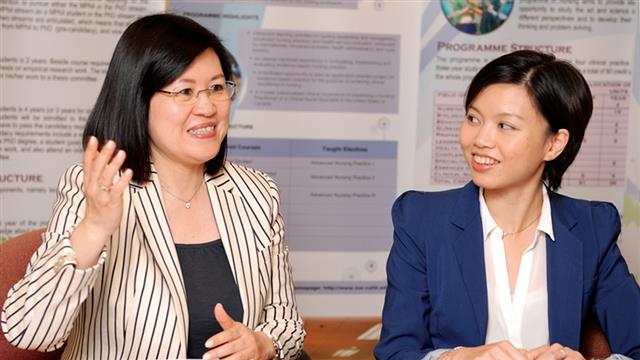Modern medicine has been so successful that almost every disease has a cure. But when it comes to death, is it really true that nothing can be done? We only live once, and that's why we are busy planning for a 'good life'. But is there such a thing as a 'good death'? What roles do health care providers play in helping patients to secure a good ending?
'Research shows that patients at the end of their lives want their final days to be pain-free, peaceful, and with the presence of family members. Medical technology prolongs life—those who cannot breathe can be kept alive on a breathing machine, and those who have swallowing problems can adopt tube feeding. However, from a palliative point of view, these procedures are probably prolonging the dying process and at the same time causing more discomfort to the patients,' said Prof. Helen Chan of the Nethersole School of Nursing. The World Health Organization defines palliative care as an integration of the physical, psychosocial and spiritual aspects of patient care, and a support system to help patients live as actively as possible until death. However, it is not a concept widely known and understood in Hong Kong.
According to Professor Chan, the top 10 causes of death in Hong Kong have switched from accidents to chronic diseases in the past 10 years. People living with chronic physical conditions are at risk of developing other aspects of suffering. 'A 60-year-old patient with chronic obstructive pulmonary disease told me that he had not stepped out of his home for two years. Once a macho smoker, he is now inseparable from his oxygen machine. He feels he cannot face his friends and relatives anymore and becomes increasingly isolated. Spiritually, he begins to have existential concern: what on earth am I here for?'
Addressing Physical and Psychosocial Concerns
Patients who receive palliative care are encouraged to go on to enjoy a normal social life, see friends and do exercise in day centres. In a later stage when they feel too weak to go out, it is the time they need to increase visits to hospital, while nurses will provide home-based care to address their needs and their families. They don't need to stay in hospital until the last few months, where the presence of an accompanying family member is always allowed.
For patients with diseases at an advanced stage, what they need is no longer a cure, but relief from suffering. Instead of resorting to life-sustaining instruments, such as CPR, nasogastric intubation and oxygen machines, it focuses on providing relief from distressing symptoms, such as pain, nausea and shortness of breath, to make sure that people die with dignity and grace.
Preparing for the Final Journey
To make sure patients get the medical care they would want, and meanwhile take some of the burden off their families, palliative care encourages advance care planning. It is the process of specifying future health care treatment when patients are still capable of deciding for themselves, and health care providers play an important role in assisting them to make an advance care plan. 'Many people mistakenly believe it is inappropriate to bring up such sensitive subjects with patients. That's why we teach students the correct way to communicate and broach the subject. At first the students found it hard to start the conversation, but it turns out that patients are ready to talk as long as the question is asked,' said Prof. Diana Lee, director of the Nethersole School of Nursing.
Finding the Meaning of Life
In the face of death, people tend to ponder or even doubt the meaning of life. The Nethersole School of Nursing teaches the concept of 'life review' so that students can use it to assist patients to find their life meaning. 'They should have a positive evaluation of themselves at the end of their lives. Many of the patients would say they had accomplished nothing, but they neglect the fact that bringing up their children already counts as a major accomplishment,' said Professor Lee. The school's gerontology programme has an assignment in its curriculum that requires students to visit an older adult with chronic illness and make him or her a 'life story book', that will enable the seniors to have a bird's-eye view of the different stages of their lives, instead of dwelling too much on the negative experiences.
A Team Approach to Care
Palliative care employs a team approach to minimize pain and suffering. The core team includes doctor, nurse, chaplain, social worker, dietitian, psychologist and volunteer. 'Accordingly, our gerontology programme is a multidisciplinary collaboration. We have in-house doctors, nurses, psychologists, sociologists and social workers. We will invite occupational and physical therapists to give lectures, and chaplains to speak on spiritual topics,' said Professor Lee.
Professor Chan said palliative care started in Hong Kong two decades ago. Around 15 hospitals are now providing palliative care services. Professor Lee held that palliative care services should not be the exclusive responsibility of palliative care units, but a necessary knowledge and skill that all health care providers should have. 'It is so far a specialty. But the specialty needs de-specializing, since dignity and quality of life are something all patients deserve,' said Professor Lee.


